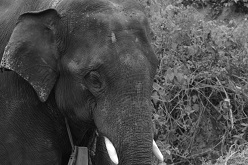Senior elephants reveal the secrets of healthy ageing
A range of factors have been discovered that influence ageing in long-lived mammals like ourselves. Researchers with the AGEISM project used innovative approaches and combined the study of senescence patterns with ageing mechanisms. The team also investigated how ageing processes interact with variations in lifelong health and stress status, as well as hormonal indications of stress in Asian elephants. Project researcher Dr Sophie Reichert explains, “The study will help us to establish which molecular markers best represent individual health history and to understand how health history can predict ageing rates.” Ageing markers measured in the study were telomere length using quantitative polymerase chain reaction assays and oxidative stress markers. Both processes play an important role in ageing. Telomeres are the end sections of chromosomes that control cell division. The rate of telomere shortening varies and depends on both the number of cell divisions and oxidative damage inflicted on telomeres. Maternal age and sex allocation AGEISM examined the effects of advanced maternal age on offspring condition, age-specific reproductive success, and long-term survival. Data showed that offspring born to older mothers display reduced overall survival and higher age-specific reproductive success, but reduced survival of their own progeny. “These results show rare evidence of a persistent effect of maternal age on fitness across generations in a long-lived mammalian population,” points out Dr Reichert. Project research then turned to sex allocation and how interactions between relatives can ultimately influence the expected sex ratio of female to male of 1:1. They investigated how differential sex allocation might impact offspring condition, age-specific reproductive success, and long-term survival. Calves born after a male sibling have overall reduced body mass and lower survival compared with those born after females. The sex of the previous offspring also seems to impact the reproduction of the subsequent siblings, with females born after a male sibling reproducing more slowly. “This is the first time such a long-term intergenerational cost has been shown in a mammal species,” remarks Dr Reichert. Health data collected helped to unravel the potential underlying mechanistic causes of senescence patterns in the Asian elephants. Different physiological markers of health (body score index, blood cell counts, liver and kidney functions) vary across age. “In the results of this study, we see a decline of body condition, immune and liver functions with age; which is the first evidence of senescence on physiological traits,” states Dr Reichert. Challenges along the research path Asian elephants are an endangered species and the procurement of permits for this shipment from Myanmar, Burma (import/export permits and material transfer agreements) as well as organisation for a suitable carrier company took longer than anticipated. This resulted in the samples being shipped with delays (in October 2016) compared to the initial schedule. Originally, the team planned to measure telomere lengths from blood samples collected on cards but work at the University of Glasgow showed that storage in ethanol was a more suitable storage method. The downside is fewer sampling years but modifications ensure sufficient DNA quality for telomere assays, a crucial factor. AGEISM data - a foundation for human ageing studies New funding for a novel multidisciplinary project based on results of the Marie Curie project will enable investigation of the functional links between individual differences in lifelong-health risks, reproductive senescence and ageing markers. The aim is to gain a broad understanding of the decline of fertility in a long-lived mammalian species including humans. Future results will identify how molecular and physiological markers of ageing (telomeres and oxidative stress) interact with variations in health and stress status and how they determine ageing rates and individual variation in senescence rates. Dr Reichert expresses her research goals for the future based on AGEISM. “Our approach also offers unique comparisons to humans, thus providing opportunities to contribute towards improving human health and quality of life at old age.”
Keywords
AGEISM, ageing, telomere, elephant, long-lived mammal

